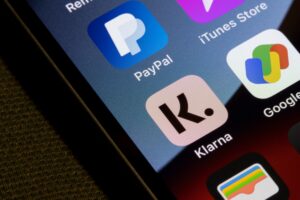The buy now, pay later company Klarna will start reporting UK customer debts to credit agencies for the first time next month, in a move that could affect shoppers’ credit ratings from 2023.
The company will start sharing customer data with the two agencies from 1st June, meaning credit card companies will be able to see transactions and debts when conducting formal checks on potential borrowers.
Below, Nick Drewe, a money-saving expert at discounts platform WeThrift, shares the risks associated with using credit cards, what people should consider before applying for the new physical Klarna card, and tips for those who do find themselves in debt after getting too carried away with the ‘buy now, pay later’ mentality:
“Buy Now Pay Later schemes offer consumers a quick payment option that lets them delay or split the cost into more digestible chunks, however, they can also become a potential entry point onto a road of damaging debt and financial issues.
“It is important to understand that online retailers that offer the option of paying via weekly or monthly instalments often fail to thoroughly explain the full terms and conditions to customers. However, the likes of late fees, background credit checks and interest repayments are factors that should be pointed out to the customer straight away.
“Like many forms of debt, it’s important to fully understand the risks associated before committing yourself to any kind of financial contract or agreement.
“Currently, despite working to come to an arrangement with credit reference agencies, Klarna doesn’t report any spending or missed payments, meaning your credit score won’t be affected when other lenders look into your payment history.
“Whilst payments aren’t being reported, these payments are still appearing on your bank statements. Therefore it will be interesting to see whether this will come into play now a new credit card is being introduced.
“It is important to know that using, then repaying, small balances on a credit card is one of the best ways to build up a credit score.”
Nick shares what you should consider before applying:
“Whilst it is all well and good wanting to build up your credit score, you must make sure you have enough money in the bank to make these repayments.
“Many people will often make purchases on ‘buy now pay later’ schemes right before payday when their bank account is feeling less healthy. However, it is important to factor in the costs of these purchases and whether you will be able to comfortably afford them after the likes of rent/mortgage, electricity bills, supermarket shopping and other monthly payments come out of your bank at the end or the start of the following month.
“With the UK’s cost of living continuing to rise, money is becoming tighter for many Brits, and solely relying on credit card schemes to fund those additional purchases can be dangerous if you are struggling to pay for your standard monthly ones.
“There are several positives to the Klarna BNPL schemes, including price drops and the ability to negotiate deals on discounts with high street and online favourites that other retailers and shopping sites can’t match.
“In a nutshell, if you are able to discipline yourself when using a Klarna credit card, there are certain positive aspects to be made to your future credit score- as long as you don’t overspend and get yourself into debt you cannot get out of without borrowing more money.”
Nick shares some important advice for those who are struggling with debt:
Make a budget: If you have different types of debt, making a budget to categorise your most high priority expenses, like rent and food, will really help. In order, you should;
Work out your total income
Make a list of your monthly outgoings
Deduct the total amount you spend each month from your monthly income
If you have any money left over after you’ve paid for everything you have a ‘budget surplus. If you’re spending more money than you’ve got coming in you have a ‘budget deficit’.
Decide which bills to pay first: It is important to know what your priority and non-priority bills are. An example of a priority debt would be your rent or your mortgage, as opposed to your direct debit for Netflix, or the meal subscription box you treat yourself to once a month.
Come to terms with your BNPL debts: It is important to accept you are in debt and start changing the way you spend. If you are struggling to make repayments, there are a few ways you can get debt help for buy now, pay later payments. For example,some brands offer payment holidays and revised payment schedules to help users pay back what they owe.
